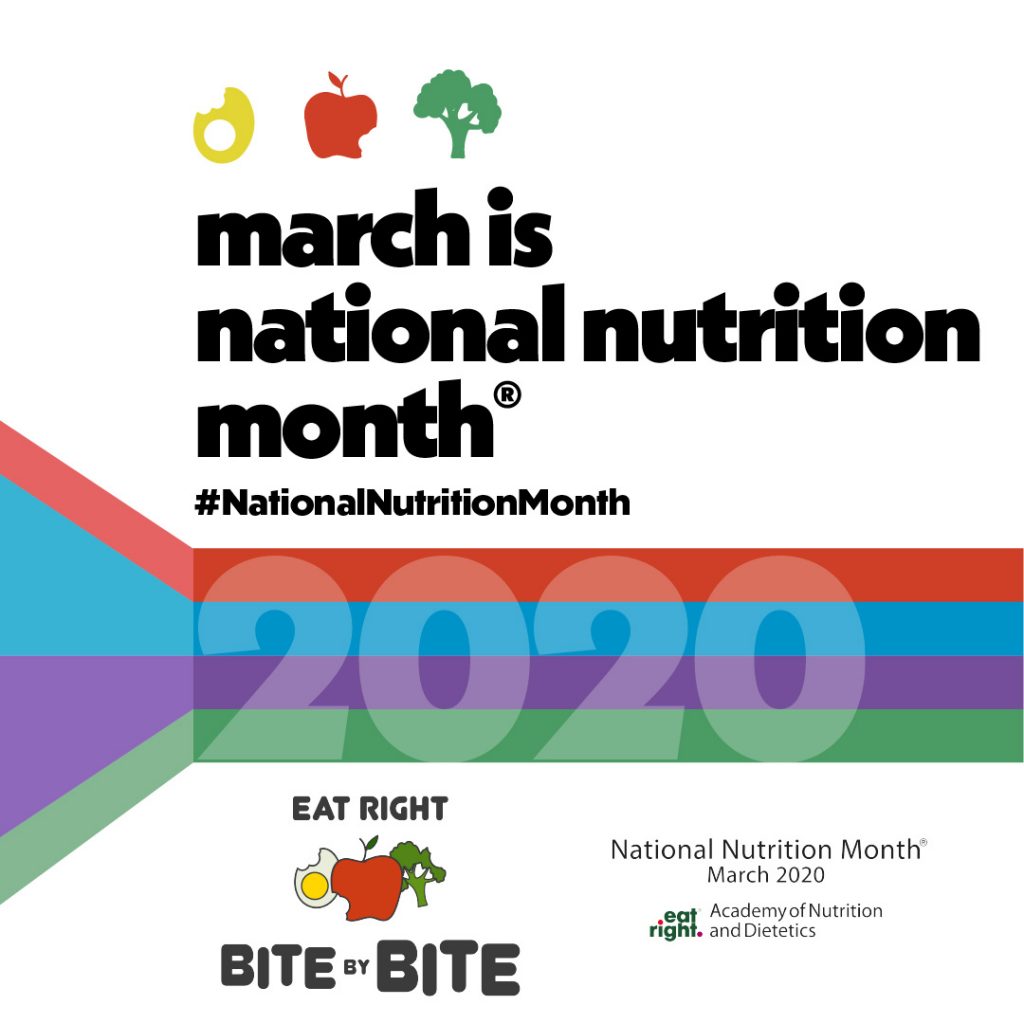National Nutrition Month recognized in March

Eating healthy is one of the most important steps you can take in improving your overall health.
People may shy away from healthy eating by saying things like “I don’t like kale” or “Broccoli is gross,” but a balanced diet is not a “one size fits all” meal plan.
This March, the Georgia Department of Public Health’s South Health District joins the Academy of Nutrition and Dietetics to recognize National Nutrition Month. This month we want to encourage everyone to Eat Right, Bite by Bite.
“Nutrition doesn’t have to be limiting,” said Holly Rountree, Nutrition Services Director with South Health District. “The best and healthiest meal plan for you is one that fits with your lifestyle and allows you to have foods you enjoy. If you don’t have two hours each night to cook dinner, then find recipes that are simpler or can be cooked in large batches and eaten as leftovers. If you love chocolate, then buy small individually wrapped pieces instead of full-size candy bars. It’s all about small steps to make a big impact.”
One of the easiest changes you can make to your diet is adding more fruits and vegetables. Strive to make at least half of your plate fruits and vegetables. You should strive to have at least 2 cups of fruit and 2.5 cups of vegetables each day.
To increase your daily intake of fruits and vegetables try varying the ways you eat them. Topping your pizza with veggies like spinach, peppers or mushrooms or grilling vegetable kabobs are easy and tasty ways to eat more vegetables. To add more fruits to your diet, try making a breakfast smoothie with your favorite fruits and low-fat milk or adding fresh fruits to your cereal or oatmeal in the morning.
The Academy of Nutrition and Dietetics also offers 20 tips for a healthier life:
- Eat Breakfast: Start your morning with a healthy breakfast that includes lean protein, whole grains, fruits and vegetables.
- Make Half Your Plate Fruits and Vegetables Fruits: and veggies add color, flavor and texture plus vitamins, minerals and dietary fiber to your plate
- Watch Portion Sizes: Get out the measuring cups and see how close your portions are to the recommended serving size.
- Be Active: Regular physical activity has many health benefits.
- Get to Know Food Labels: Reading the Nutrition Facts panel can help you shop and eat or drink smarter.
- Fix Healthy Snacks: Healthy snacks can sustain your energy levels between meals, especially when they include a combination of foods.
- Consult a Registered Dietician Nutritionist: Whether you want to lose weight, lower your health-risks or manage a chronic disease, consult the experts.
- Follow Food Safety Guidelines: Reduce your chances of getting sick with proper food safety.
- Drink More Water: Quench your thirst with water instead of drinks with added sugars.
- Get Cooking: Preparing foods at home can be healthy, rewarding and cost-effective.
- Dine Out without Ditching Goals: You can eat out and stick to your healthy eating plan.
- Enact Family Mealtime: Plan to eat as a family at least a few times each week.
- Banish Brown Bag Boredom: Whether it’s for work or school, prevent brown bag boredom with easy-to-make, healthy lunch ideas.
- Reduce Added Sugars: Foods and drinks with added sugars can contribute empty calories and little or no nutrition.
- Eat Seafood Twice a Week: Seafood—fish and shellfish—contains a range of nutrients including healthy omega-3 fats.
- Explore New Foods and Flavors: Add more nutrition and eating pleasure by expanding your range of food choices.
- Experiment with Plant-Based Meals: Expand variety in your menus with budget friendly meatless meals.
- Make an Effort to Reduce Food Waste: Check out what foods you have on hand before stocking up at the grocery store.
- Slow Down at Mealtime: Instead of eating on the run, try sitting down and focusing on the food you’re about to eat.
- Supplement with Caution: Choose foods first for your nutrition needs.
As part of National Nutrition Month, the Academy’s website, www.eatright.org, includes articles, recipes, videos and educational resources to spread the message of good nutrition and the importance of an overall healthy lifestyle for people of all ages, genders and backgrounds.
“Every step you make towards a healthier lifestyle, no matter how small, is a step in the right direction,” Rountree said. “Whether it’s eating healthier, getting more active or even just drinking more water, all of those changes can change your life for the better. Take control of your health journey, step by step and bite by bite.”
